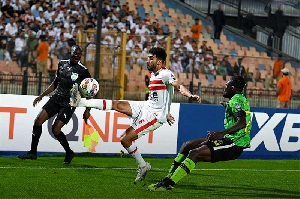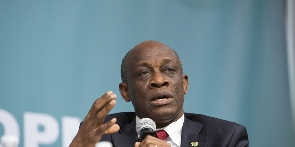- Home - News
- TWI News | TV
- Polls
- Year In Review
- News Archive
- Crime & Punishment
- Politics
- Regional
- Editorial
- Health
- Ghanaians Abroad
- Tabloid
- Africa
- Religion
- Election 2020
- Coronavirus
- News Videos | TV
- Photo Archives
- News Headlines
- Press Release
Business News of Tuesday, 11 February 2020
Source: GNA
Ghana calls for fair representation for Africa on IMO Council
Ghana has called for fair representation for Africa on the International Maritime Organisation (IMO) Council to enable the continent to play a major role in the maritime industry.
Mr Kwaku Ofori Asiamah, the Minister of Transport, who made the call, it would also enable the continent to put across issues that affected the African Maritime Industry at the international level.
At the last IMO Assembly Session, only three African countries namely: Egypt, Kenya and South Africa were elected to serve on the Council.
“Clearly, African states are underrepresented and we need to do more to increase our presence and participation on the Council,” Mr Asiamah stated, on Monday, in a speech read on his behalf, at the opening of the Fourth Executive Council Meeting of the Association of African Maritime Administration (AAMA) in Accra.
“It is known that about 90 per cent of Africa’s imports and exports are conducted by sea and that 38 out of the 54 States in Africa are Coastal, yet the statistics of Africa’s share of the international seaborne trade are not encouraging,” he said.
Mr Daniel Nii Kwartei Titus Glover, a Deputy Minister of Transport, opened the two-day meeting, which is being hosted by the Ghana Maritime Authority (GMA), is being attended by more than 40 participants drawn from across the African continent.
They would deliberate pertinent issues relating to the African Maritime Sector.
Mr Asiamah said the AAMA must also take steps to coordinate and strengthen the work of the African Permanent representatives at the IMO, and encourage members to take common positions on maritime issues affecting Africa and articulate these positions at the IMO.
The African Union through its development agenda had initiated the African Integrated Maritime Strategy (AIMS) to regulate and manage maritime issues and resources within the African Maritime Domain, he stated.
“Regrettably, the (AU) does not have a Maritime wing to see to harmonisation and development of this very important agenda,” he said.
He said the AAMA was in a unique position and should, therefore, engage the AU with a view to ensuring that maritime issues were placed high on its agenda.
He said the role of the AAMA had become more relevant in the era of the blue economy, when Africa was aiming at a structural transformation through sustainable economic progress and social development by tapping into the many benefits the seas and inland waters had to offer.
The maritime industry was the backbone of most economies across the world, he noted.
Mr Thomas Alonsi, the Director-General, Ghana Maritime Authority (GMA) expressed concern over the number of rising kidnapping cases on the Gulf of Guinea.
“It is evident by reports from the International Maritime Bureau showing that even though there was a decline in overall worldwide incidents of piracy last year (2019), there was an alarming increase in crew kidnappings across the Gulf of Guinea,” he said.
“The number of crew kidnapped in this area increased by more than 50 per cent from 78 in 2018 to 121 in 2019.”
He said the International trade (and for that matter maritime transport) was critical to almost all African economies, adding that, the maritime trade and sustainability of Africa’s marine resources would develop further only if the marine environment was safe and secured.
Mr Sobantu T. Tilayi, Chairman, AAMA, said the AAMA Executive Council was made up of representatives of Central Africa (Cameroun and Cape Verde), West Africa (Cote D’Ivoire and Ghana), East Africa (Tanzania and the Comoros), Southern Africa (Mozambique and South Africa), North Africa (Egypt and Sudan) and Uganda representing the landlocked countries.
The choice of the countries in the Executive Council was to ensure geographical spread.
He announced that the Fifth AAMA Executive Council Meeting would be held in the last quarter of the year in Durban, South Africa.











